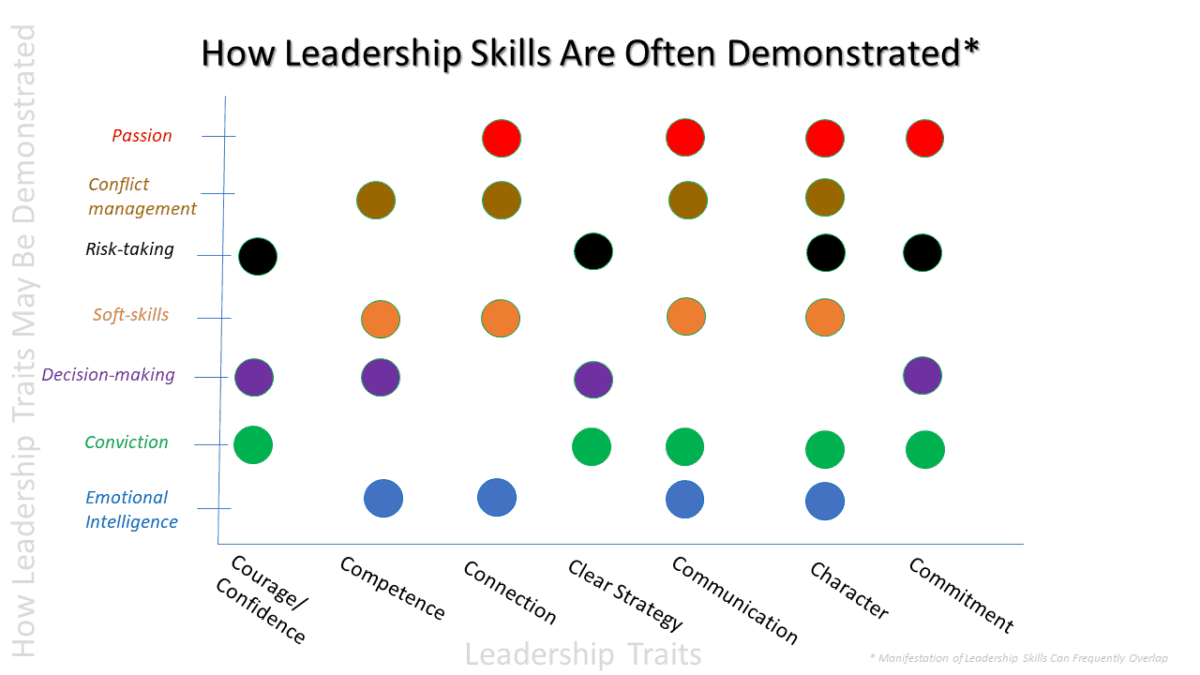In the simplest of terms, the leadership skills that are most important are the ones that guide a team to produce the results needed for success.
Have you heard of the “4 C’s of Leadership?” Maybe you’ve heard that there are five, not four. Over time, the 3 C’s, have become 4, and any number of versions can be found doing research today.
We believe that the key leadership traits can be put into one of seven categories. They include:
- Courage/Confidence
- Competence
- Connection
- Clear strategy
- Communication
- Character
- Commitment
To get more of a visual of how some of these traits are demonstrated, take a look at this graphic…
The 7 C’s of Leadership

The chart doesn’t show that there are other ways that leaderships skills can be demonstrated, and it also doesn’t show that there are overlaps between both the way that they’re manifested and the skills themselves. (For example, a leader can demonstrate their courage and confidence in other ways than through “risk-taking”, “decision-making”, and “conviction” Also charisma could fall under “confidence,” “connection,” “communication,” and possibly “character”.) It can also be argued that most of the ways that the 7 C’s are demonstrated here can fall in more of the C’s than they way they are shown here.
Now, let’s break out each one.
Courage / Confidence:

Leaders have courage to do what they think needs to be done, even if others don’t. They are willing to take risks. They have confidence in themselves and their strategy and are able to demonstrate that confidence to others, often transferring that confidence to others, even in the face of uncertainty.
“You will never do anything in this world without courage. It is the greatest quality of the mind next to honor.”
Aristotle
Competence:
Another key leadership trait is demonstrating knowledge and capability. A leader has to have depth of understanding of problems on a macro-level, and then be able to understand problems and provide solutions at a smaller level.
A leader must demonstrate that they have a good decision-making process and be able to make good decisions when it counts. Sometimes this might be the leader doing this alone, but frequently it might entail knowing when to consult others, listen, assimilate ideas, and then move forward with the best solution.
” You must have confidence in your competence.”
Elijah Cummings
Commitment:
Good leaders have a vision of where they want to go and don’t allow distractions to get in their way of achieving their goals. They may take other feedback in as things move forward; they may change trajectory along the way and adjust course, but their goals remain solid in the focus of their efforts. They have an idea and clear steps to get from here to there.
“The quality of a person’s life is in direct proportion to their commitment to excellence, regardless of their chosen field of endeavor.”
Vince Lombardi
Connecting:

Leaders know how to connect with people… people at many different levels. They know how to instill passion in them. They often will make the people at these various levels feel like the leader understands them. Many times, the leader can instill passion in the masses for the common goal. They connect through their ability to communicate their vision, and their passion for the end goal. Connecting like this requires an ability to touch others through interpersonal skills, or to connect with them through their way of communicating through the levels. On a much broader level, connecting involves a social intelligence; the ability to operate effectively in a variety of different social setting and circumstances.
“Communication is merely an exchange of information, but connection is an exchange of our humanity.”
Sean Stephenson
Communication:
This is a key leadership skill; it’s the ability to transfer knowledge, ideas, direction and/or emotions to others. How this transfer happens can be every bit as important to a good leader as what is being communicated. Leaders influence others by how they communicate.
Communication encompasses Emotional intelligence, or the ability to connect at the emotional level with others.
“The art of communication is the language of leadership.”
James Humes
Character:
This can mean a lot of things to different people, but here we’d like to say that it might include any or all of the following:
- Doing the things that others don’t want to
- Staying positive when circumstances seem bleak; maintaining a sense of humor
- Showing humility and learning from past mistakes; being human
- Using failure as a launch pad for a new initiative
- Having compassion
“Our character is what we do when we think no one is looking.”
H. Jackson Brown, Jr.
Highly skilled leaders that garner respect and motivated followers have some combination of these leadership traits. The combination is unique to the individual and may change as the leader’s circumstances change. They have situational awareness, and the ability to shine in the areas that are most beneficial based on the specifics that they’re dealing with. They use what is called situational leadership.
The ability to read the dynamics of the environment – both the needs of the business and how the work force might fit best in achieving the business goals—are key.

